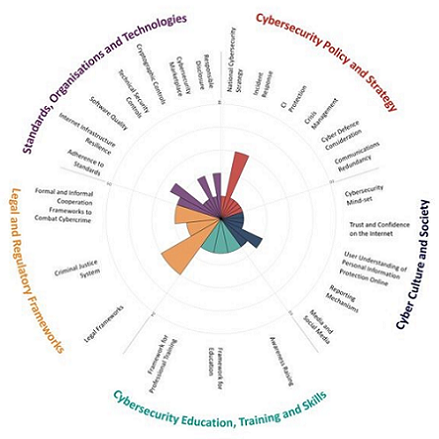The Former Yugoslav Republic (FYR) of Macedonia is making strides in the area of cybersecurity. In 2018, the government increased its efforts in this sphere by adopting the National Cybersecurity Strategy 2018-2022 and preparing a National Action Plan. Furthermore, a multi-stakeholder, inter-agency coalition has also been formed, which includes the Ministry of Information Society and Administration, Ministry of Defense, and Ministry of Interior.
The country also hosted the Western Balkans Digital Summit in Skopje - the first ever summit of its kind in the country – which focused a lot of attention on matters of cybersecurity, among other topics, and featured participation by EU Commissioner for Digital Economy and Society Mariya Gabriel and Minister of Information Society and Administration Damjan Manchevski, among others.
Going forward, plans are underway to establish a Regional Cyber Security Academy based in Skopje. Following examples of the EU and the USA, the country has also embraced the idea of turning October into Cybersecurity Awareness Month - full of dedicated activities promoting cyber resilience among the general public.
Throughout this process, the World Bank has remained a reliable partner. A key element in this partnership has been the “Global Cyber Security Capacity Building Program,” financed by Korea’s Ministry of Strategy and Finance (MoSF), through the Korea-World Bank Group Partnership Facility (KWPF), and administered by the World Bank. The program catalyzes expertise and training in FYR Macedonia – one of six countries benefitting from the program – and leverages two key strategic partnerships: with the Global Cybersecurity Center for Development (GCCD), part of Korea’s Internet & Security Agency (KISA), and Global Cyber Security Capacity Centre (GCSCC), from the University of Oxford.
This program started in January 2018 with a review assessment under the Cybersecurity Capacity Maturity Model for Nations. FYR Macedonia has become the third country in the Western Balkan region to benefit from this review and the ninth in Europe. The review, carried out by the GCSCC, assisted the Government in gaining insight into the breadth and depth of their cybersecurity capacity through a benchmarking exercise across five dimensions: cybersecurity policy and strategy; cybersecurity culture and society; cybersecurity education, training and skills; legal and regulatory frameworks; and standards, organizations and technologies. The report is available here.
Three ministries, those that had formed the cyber coalition mentioned above, led the review – convening stakeholders and ensuring recommendations were used to inform the National Cybersecurity Strategy and National Action Plan.
Following the assessment, we invited our partners from GCCD of KISA for a two-day training dedicated to practical aspects of cybersecurity, as seen by Korea’s forward-looking public sector. A high-level delegation of Korean experts delivered a workshop in Skopje, in April 2018, which was attended by over 60 representatives from the public sector, private sector, and academia. Topics included e-government security, incident response, global cyber incident trends analysis, cyber incident analysis in the finance sector, and much more.
Now we are at the stage of supporting the preparation of the draft National Cyber Security Action Plan through narrowly-tailored consulting support by internationally recognized experts. In parallel, a cybersecurity awareness video has been produced to introduce the general public to the importance of cyber ‘hygiene.’
Related Reading:
The Global Cybersecurity Center for Development, established in 2015, aims to share practical knowledge and support capacity building in the field of cybersecurity.
The Global Cyber Security Capacity Centre is a leading international center for research on efficient and effective cybersecurity capacity-building, promoting an increase in the scale, pace, quality and impact of cybersecurity capacity-building initiatives across the world.